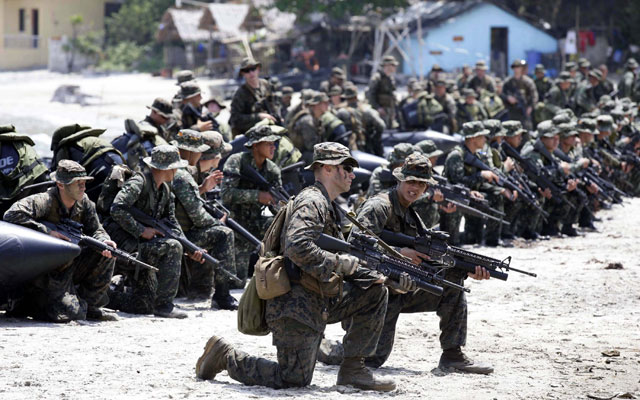For Marines, Forces Shrink as Responsibilities Grow
Clark Irvine / Brian Slattery /
The President recently directed Marines to be stationed at diplomatic locations in volatile regions of the world, as part of a response to the Benghazi attack last year. Meanwhile, Marines are also deploying across the world for myriad security concerns—even as they contemplate a significantly reduced force due to defense budget cuts.
From combatting the drug trade throughout Latin America to responding to the recent escalation of violence in Nairobi, it is clear that the Marines’ responsibilities are growing. At the same time, however, Marine Commandant General James Amos has warned that cuts to defense spending threaten responsiveness, as Marine forces are projected to shrink from 194,000 to 176,000.
The Marines rely on the Navy for overseas deployment, but the Navy is facing its own budget problems. The current U.S. fleet has been reduced to less than half the size it was at the end of the Reagan Administration, but its responsibilities are expanding. For example, the Navy has had to surge to the Mediterranean because of the Syrian conflict, putting the Asia–Pacific pivot on hold.
Budget pressures have reduced the number of ships patrolling the seas throughout U.S. Southern Command (SOUTHCOM)—Central America, South America, and the Caribbean—to essentially zero. Furthermore, the Marines have consistently stated that the force structure that America demands of them requires no fewer than 33 amphibious vessels and ideally 38. However, the fleet is currently at 28 ships and shows no sign of increasing due to a chronically underfunded shipbuilding budget.
Although the U.S. is still the dominant power in the Western Hemisphere, emerging global powers such as China and Iran are attempting to exert influence over weaker and more vulnerable South and Central American states. Having a forward-deployed military force in SOUTHCOM’s current geographical area is critical for preserving America’s strategic interests.
While it is the Marine Corps’s responsibility to act as the tip of the spear for U.S. security, it is the government’s constitutional responsibility to provide for it and America’s other defense forces.
Clark Irvine is currently a member of the Young Leaders Program at The Heritage Foundation. For more information on interning at Heritage, please click here.

